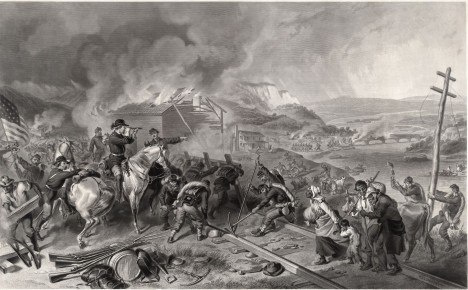Previous Post: Army Life After the Fall of Atlanta
Little Doctor on the Black Horse
March to the Sea
by Harriott Benedict Wickham Barton
.
“Kingston, Ga., Nov. 16 ‘64 – Dear Hattie, We start tomorrow for the south, destroying things as we go. There will be no communication between us for some time. The mail goes in 15 minutes. If you never hear from me again, take good care of yourself and the children. Write as usual and some of your letters may reach me somewhere. – The natives around here are queer specimens of humanity. The women look as if they are all head and legs. Their waistlines are clear up under their arms. No hoops encase their legs, nor bran bags adorn their backs. Cotton is so scarce they can’t afford it for ‘breast works’! — No more, the mail boy is waiting . Kiss the babies for me. Your affectionate husband.”
(The women must indeed have looked strange to one accustomed to the over-upholstered ladies of the period, when even little girls wore hoop skirts).

Engraving of Sherman’s March to the Sea – From Wikipedia Commons – In the Public Domain
And with this David started off with Sherman’s army on the historic March through Georgia. He leaves no record of this campaign in his letters. When he writes again, it is Dec. 14, almost a month later, and the 17th is in camp 5 miles from Savannah, which is still in Rebel hands. Then:
“Dec. 21, ‘64 – Dear Hattie, You write of the many sad hearts on Thanksgiving. Now how many glad hearts are there in the North? You must now know that the Rebs left Savannah last night, and we have it. I have been all over the city today.”
GO TO NEXT POST – Christmas in Savannah –
About the Author: Harriott Benedict Wickham Barton (1890-1981) was born in Norwalk, Ohio to Frank and Agnes Wickham. Her father was the youngest of twelve children of Frederick and Lucy Wickham, early settlers of the Firelands, and her mother was the great-great granddaughter of Platt and Sarah Benedict, who founded the city of Norwalk. Educated at Norwalk High School and Wooster College, she became a teacher. She marched as a suffragette and worked for the Labor Department during World War I. After the war, she went west to teach school, and became one of the last homesteaders, proving up a property near Wheatland, Wyoming. She married Angus Barton in 1924 and they raised four children on the homestead through the Dust Bowl and World War II. In the late 1940s, she and her Angus moved to Ohio, where they spent the rest of their lives. During the 1950s and ‘60s, she wrote “Little Doctor on the Black Horse,” poetry, and short stories, some which were published in various journals and magazines.
© 1961 by Harriott Benedict Wickham Barton. All rights reserved.
Thanks for visiting! Share and like this post below, and on Facebook. Let me know what you think in the comments. I’d love to hear from you!
Filed under: Civil War | Tagged: Civil War, David DeForest Benedict |


Leave a comment